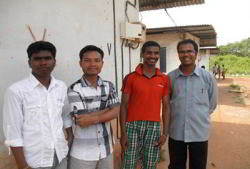|
Accompanying Distress Migrant Workers
Martin Puthussery SJ (CCU)
 My first experience with migrant workers was when I was a 23 year old scholastic. I was travelling by train, in an emergency from Calcutta to Kerala, my home State in an unreserved coach. The coach was overcrowded with young Bengali men travelling over 2500 kilometres south, in search of work. During the 45 hour train journey, some young men of my age shared with me about their families, work they did in their villages, reasons for migration, types of work they were going to do, their aspirations, etc. One of them even offered me a cup of tea. My first experience with migrant workers was when I was a 23 year old scholastic. I was travelling by train, in an emergency from Calcutta to Kerala, my home State in an unreserved coach. The coach was overcrowded with young Bengali men travelling over 2500 kilometres south, in search of work. During the 45 hour train journey, some young men of my age shared with me about their families, work they did in their villages, reasons for migration, types of work they were going to do, their aspirations, etc. One of them even offered me a cup of tea.
This first encounter had an impact later in 2011 on my volunteering to initiate work among the migrant workers in Kerala. In the evenings I visited migrant workers in the labour camps and built rapport with them. Gradually I began to get involved in their issues such as non payment of wages, police cases, accidents, sickness, deaths, discrimination by the locals, etc. Thus, with over 500 workers, the Jeevika- Migrant Workers Movement was formed.
One of the most saddest involvements in my life was in the case of Dipen Konra, a tribal migrant worker in Kerala, from West Bengal. I found Dipen lying in a general hospital, with plaster from neck to feet with both the legs tied together and guarded by two policemen. Later I came to know that he had been travelling to toil at a construction site in Kerala, in a suffocated general compartment. At the Aluva railway station, Dipen got down to fetch water and could not get back into the over-crowded general bogey to reach Kollam, his destination. Not knowing what to do and unable to speak Malayalam, the poorly dressed Dipen began to walk. In the late evening, he was found by the Police, tired and dirty, and questioned in Malayalam. Since he could not answer and appeared strange, he was taken to the Police Station. In the early hours, with a mere desire of escaping, he ran away and without knowing entered the adjacent air port compound. Suspecting Dipen to be a Maoist or a terrorist, he was beaten in such a way, that his legs and hands were broken and he became unconscious. Since he was in police custody he was soon transferred to a jail. I visited him in jail and took up his case in the courts. I also functioned as a translator for him in the courts. Meanwhile, I approached the State Human Rights Commission and with the Commission's intervention he was transferred to the hospital for further treatment. Nine months after the assault, Dipen was released from the jail and on an Easter Sunday he boarded a train to reach back home. Later I visited him in his home in West Bengal.
Involvement in the case of Dipen made me realise that several migrant workers are languishing in jails for the crimes not committed by them. Thereafter, I visited several prisons and with the support of others helped a few to get out of prisons in Kerala. In some cases, it was to free the migrants from implication in false police cases.
I also encountered a shocking number of accidental deaths of migrants. With the help of others, including the government and employers, we managed to send over 20 dead bodies to their home States for the last rights by the relatives. In about ten cases, we had to provide proper burial or cremation, in the presence of friends near the work sites.
During the Ignatian month in Tertianship, I was affected by the meditation on the Flight of the Holy Family to Egypt. That further compelled me to continue working among the migrants. After the Tertianship, I volunteered to start the Labour and Migration Unit at Indian Social Institute (ISI), Bangalore.
In Bangalore, with the Archbishop, I took the initiative to start the Commission for Migrants, to look after the pastoral as well as other needs of migrants, including African nationals. I also conducted programs narrating the 5 mysteries of Jesus the Migrant, the Sojourner and an Outcast for many groups including Catholic Religious of India (CRI).
Annual messages of Pope Francis on the World Day of Migrants and Refugees are great source and inspiration for my work with migrants. "Migrants and Refugees Challenge us - the Response of the Gospel of Mercy" was an apt theme chosen for the 2016 World Day of Migrants and Refugees. The Pope said, 'Jesus was a migrant who reminds us of the plight of today's refugees'. Yes, Pope Francis is a great inspiration to my accompaniment with distressed migrant workers.
(Martin is the Coordinator of Labour & Migration Unit at Indian Social Institute, Bangalore)
|